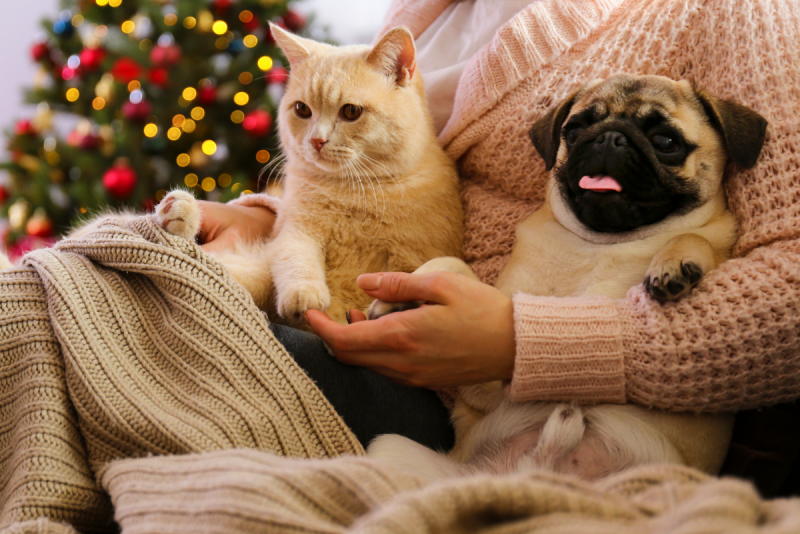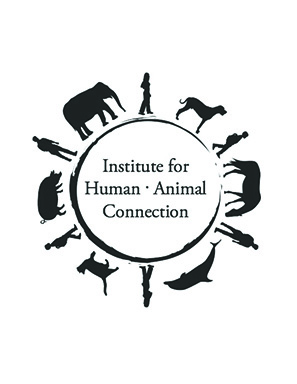Holiday Considerations for Companion Animals
Plan a Safe and Happy Holiday Season for All

The holiday season is upon us again, with its typical spectrum of emotions from joy and happiness to grief and despair. Perhaps these emotions are also amplified by issues unique to 2020, such as the dual pandemics of COVID-19 and racial injustice in the U.S. There are also many aspects of the holidays that might be experienced as stressful by a dog or any companion animal species. To begin with, many people are stressed by holiday events and expectations. Our companion animals are watching us carefully and are highly attuned to changes in our mood, posture, energy and even tone of voice. Dogs recognize a 16th of a millimeter change in the human face, so it’s safe to assume that they will recognize our stress signals, if we are worried about hosting our family or meeting the parents of a new partner!
Holidays often alter routines for both human and non-human animal members of the household, including work schedules, travel, new people in our home, parties, moving furniture and/or changing exercise and feeding routines. This does not mean that all companion animals will have significant reactions to these changes, only that they often rely on predictable routines to know what is occurring and to determine how they can participate. In order to offer our dog, cat or other companion species the best support,, we can plan ahead and try to evaluate the changes they might experience during the holidays, from their perspective. For example, having some routines that stay consistent can be really helpful, including: 1) where they eat; 2) familiarity with their environment, especially sleeping; 3) activity and exercise; 4) consistent diet; 5) safe places and items that are their own (bed, toys and treats).
While this year may be different than in the past due to COVID-19 precautions, if you are having new people in your home over the holidays, there are a few additional things to consider. As mentioned above, dogs notice everything, and other companion animals such as cats and birds will also be well aware when there’s someone new in our space. As their caregivers, we need to be equally observant so we can best anticipate their needs. If there are new people invited into the home, it can be useful to carefully plan for these interactions. For example, if you have a large party at your house (during non-COVID times), even the most well-adjusted dog can find it overstimulating to hear the doorbell ringing constantly, people loudly greeting one another and coming and going. It might be helpful for your dog to have a safe place or person to be with during the event, allowing them to either avoid the frenzy or be introduced. Dogs and cats can be confused and disoriented by new people in the home, so allowing adequate time and proper introductions can be useful and planned for ahead of time. For dogs, meeting new people outside on a walk or in the yard can prevent an uncomfortable situation of trying to introduce them to persons in a crowded hall or doorway. Our dogs can be possessive of their relationship with us and their things. This means we also need to be sure that they are not confused or jealous and that they still receive adequate attention and respect for themselves and their belongings. Cats are highly sensitive and need time to adjust to changes in their environment. Make sure your feline has a safe, comfortable, and familiar place to escape to when they feel overstimulated, perhaps a quiet bedroom or cozy hiding place where they can observe without feeling threatened.
Belief in Animal Mind is a concept or theory of cognition that highlights the fact that non-human animals have thoughts and feelings of their own. In this sense, the types of experiences that can reduce stress for ourselves can often be helpful for our dogs and other companion animals. That said, the most important thing to do is plan ahead! A useful “plan-ahead” strategy is to create a calendar of the entire holiday season. You can determine from morning to night what your dog might experience each day, and what changes to their routine you should anticipate and plan for. Who is visiting and when? How might the visitors impact or change your dog’s every day activities? What environmental changes might occur each day…will there be loud noises, new smells, food preparation, different sleeping locations, changing access to parts of the home, new people, animals, or children? Once you have carefully looked at each day, identify the resources you might need to ensure that your dog has what they need to be successful and happy.
You have the opportunity to become an advocate for your pet’s safe and healthy participation in the holiday plans. For example, if you know you are going to be gone for long stretches of time, find someone who can help care for your unique companion animal. Let your dog or cat get to know others who might care for them, before you are planning to be gone. Having someone stay in your home can be much less disruptive for your dog or cat than having them stay elsewhere or in an unfamiliar home. Their routine can be maintained well if you plan ahead. Another example is that exercise that might be part of your regular routine and might be altered if you have family obligations. However, exercise reduces stress levels in dogs (and humans), so it is in your and your dog’s best interest to figure out an alternative exercise routine during stressful times.
Companion animals are resilient and adaptable, but it is up to us as the human caregivers to consider upcoming changes and new experiences and how they may affect our dogs, cats, and other companion animals. Prioritizing your animal companion’s mental and physical well-being during the holiday season will help reduce stress and ensure for a safe and happy holiday season, for all!
Learn more about animal behavior and human-animal interactions through our education programs and Interconnected webinar series.
